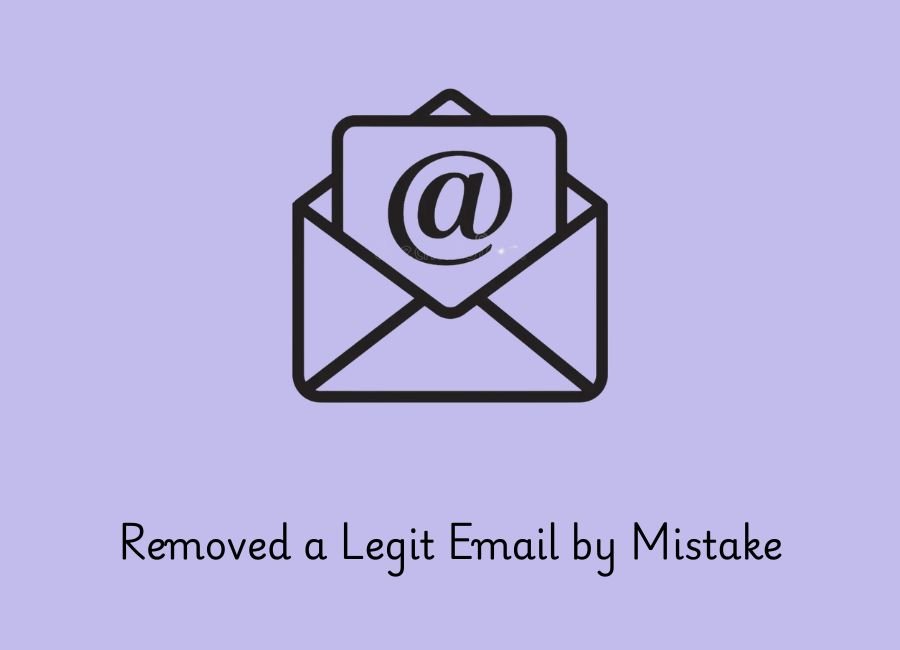Mistakenly removing a legit email can feel like losing your house keys. One second it’s there, and the next it’s gone. Whether you clicked “delete” by accident or marked it as spam, don’t panic. Most email providers offer quick ways to undo the damage. This guide will show you how to recover your email, prevent future mistakes, and stay on top of your inbox.
Why It Happens More Often Than You Think
We all move fast. Emails come in non-stop, and one wrong click can remove an important message. It might be:
- Buried in a flood of junk
- Flagged as spam by mistake
- Auto-archived by a filter
- Deleted during a bulk cleanup
If this sounds familiar, you’re not alone. Let’s look at how to get that email back step by step.
Step 1: Check the Trash or Deleted Items Folder
Most email platforms, like Gmail, Outlook, and Yahoo Mail, move deleted messages to a Trash or Deleted Items folder for up to 30 days.
- In Gmail: Go to the Trash label
- In Outlook: Look in Deleted Items
- In Yahoo: Check the Trash folder
If you spot the message, just hit “Move to Inbox” or “Restore.”
🔗 For Gmail-specific help, visit Google’s official guide on how to recover deleted Gmail messages.
Step 2: Check the Spam or Junk Folder
Sometimes legit emails land in the Spam folder. This can happen if:
- The sender’s domain was flagged
- You clicked “Report Spam” by mistake
- The email looked like a promotion or alert
To fix it:
- Open your Spam/Junk folder
- Find the email
- Click “Not Spam” to send it back to your inbox
Doing this also trains your email provider to avoid similar mistakes.
Step 3: Search by Keywords, Not Just Sender
Can’t find the email? Use the search bar with:
- Subject line keywords
- Names of attached files
- Dates or time frames
- The sender’s email (if you remember it)
Most mail apps support advanced search tools to narrow your results.
Step 4: Restore from Archived Folders
Some users archive emails without realizing it. In Gmail, for example, the “All Mail” section holds everything except Spam and Trash.
Search or scroll through All Mail if you’re unsure whether it was deleted or just moved.
Step 5: Use the Email Provider’s Recovery Tool
If the message is no longer in Trash or Spam, your provider might still help.
- Gmail: Use Google’s Message Recovery Tool
- Outlook: Visit the Recover Deleted Items page
- Yahoo: Use their Mail Restore Request tool
Act quickly. After 30 days, most emails are permanently erased.
Step 6: Add the Sender to Safe Contacts
Once recovered, prevent future issues by:
- Adding the sender to your contacts
- Marking the message as “Important”
- Creating a filter to never send emails from that address to Spam
This helps ensure future emails from that sender land safely in your inbox.
Step 7: Set Up Alerts and Backup Options
To avoid losing critical emails in the future:
- Turn on desktop or phone notifications for new mail
- Use filters to label or star key messages
- Connect your inbox to backup tools like Google Takeout or Outlook Export
You can also forward important emails to a secondary account automatically.
A Tip for Business Owners: Don’t Let Emails Slip Through the Cracks
If you’re managing a website or online business, lost emails can mean missed leads or client opportunities. Good inbox hygiene and automation tools can help.
Want more than just email recovery? If you’re also focused on growing visibility and leads, you’ll find this helpful:
Check out How To Boost Organic Traffic With Garage2Blobal to improve site performance and stay connected with your audience.
Final Thought: Mistakes Happen, But You Can Recover Fast
It’s easy to remove a legit email by mistake but just as easy to get it back if you act quickly.
Whether it ended up in Trash, Spam, or some hidden folder, most emails can be retrieved within days. Going forward, a few smart settings can help you avoid the same issue again.
FAQs
Most providers keep deleted emails for up to 30 days. After that, recovery options may be limited or unavailable.
Spam filters may flag legit emails due to sender reputation, wording, or past user actions like marking similar messages as spam.
Try searching in “All Mail” or archived folders. If still missing, use your provider’s recovery tool or support helpdesk.






